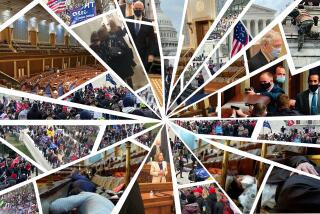U.S. Troops in Mosul Battle Mob
MOSUL, Iraq — U.S. Special Forces troops caught in the middle of a political power grab battled a violent mob with assault rifles and heavy machine guns from the governor’s building here Tuesday.
A crowd of more than 2,000 repeatedly surged at the building for roughly an hour, hurling rocks and chunks of concrete, as U.S. soldiers drove them back with one barrage after another, including rounds from .50-caliber machine guns. There were unconfirmed reports that at least 10 people were killed.
After the mob broke up, smaller groups formed throughout the afternoon to attempt new attacks. The Special Forces called in two American warplanes that shrieked just above the city’s rooftops. But the low passes were no more frightening than an air show at a country fair to the angry protesters.
What started the fighting was unclear. One local chieftain said it came because U.S. troops raised the American flag above the governor’s house, an accusation denied by the U.S. Special Forces commander here. Another cause could be the rising tensions between rival Kurdish fighters who entered Mosul with American troops last week.
The events were eerily reminiscent of Somalia, where U.S. forces defended themselves by firing on crowds of civilians as rival factions clashed in 1993. And just as in Somalia, the truth of what caused the bloodshed in Mosul on Tuesday was quickly lost amid angry claims and counter-claims by factions angling for advantage in the city’s new order.
The unrest broke out about 11:30 a.m., when a crowd of roughly 1,000 people was listening to a speech by an official of the Patriotic Union of Kurdistan, one of two Kurdish factions that entered Mosul last week with American troops. Misha’an Juburi, an Arab clan leader who laid claim to the governor’s building last week, said the mob was enraged at the sight of a U.S. flag that he said was raised atop the building alongside three Iraqi flags while the speech was being delivered.
Lt. Col. Robert Waltemeyer, commander of the 10th Special Forces troops defending the Mosul governor’s building, said he gave no order to raise a U.S. flag.
“We’ve been very discreet, very respectful in our approach to the Iraqi people,” he said. “We’re not coming in here as conquerors. We want to come as folks who can help them seek their own level of democracy.”
As the PUK leader was giving a speech, local Arab leaders appeared on the steps of the governor’s house accompanied by fighters from the other Kurdish faction -- the Democratic Party of Kurdistan -- and U.S. troops.
The mob began hurling rocks and broken concrete at the politicians and U.S. soldiers, and overturned a car near the building’s front entrance. The crowd swelled to about 3,000, and American soldiers rushed in to reinforce the building’s defenses.
Spanish newsman Miguel Rovira, who was at the scene from the start, said U.S. soldiers held their fire for about 20 minutes, but began shooting when the crowd tried to rush the building.
A .50-caliber machine gun mounted on an American Humvee pounded off at least two dozen rounds. Other soldiers knocked desks over in the lobby and took up firing positions behind them.
Several boys ran within a few yards of the front gate, hurling stones directly at the soldiers even as the air crackled with gunshots. Most of the firing was over their heads and many people ran back into the fray when they realized the Americans weren’t shooting at them.
Waltemeyer said he wouldn’t speculate about the number of deaths or injuries, but insisted U.S. soldiers would not fire at stone throwers. “We don’t fire indiscriminately at all,” he added.
Juburi, who made the flag-raising accusation, took over the Mosul governor’s building Thursday, after Iraqi forces abandoned the city. He is a close ally of KDP President Massoud Barzani and took over the building with the leader’s blessing.
He arrived in Mosul with Wafiq Samarrai, Saddam Hussein’s former head of military intelligence, who defected to the opposition in 1994. Juburi said he negotiated the city’s surrender with Ibrahim Ullah, sheik of the Juburi clan, and had it confirmed at a meeting of 40 tribal leaders Thursday in the village of Najma, south of Mosul.
“I promised I would take control of the city and the administration of it,” Juburi said. “They promised they would not hurt anybody. And they promised officers of the security agencies and [Hussein’s] Baath Party would stay home.”
He said he seized the governor’s building with about 500 of his own militiamen, and described Waltemeyer’s Special Forces soldiers as interlopers who showed up Monday morning and refused to recognize his administration.
“They said, ‘Now we have control of this building,’ ” Juburi said. As Juburi accused Waltemeyer of political meddling, the lieutenant colonel strode into the salon in full combat gear and confronted the self-proclaimed ruler of Mosul: “Why are these people attacking my building?” Waltemeyer asked.
Juburi shrugged him off and turned to a reporter: “When someone speaks like this, how can people accept it?” he asked. “I’m the man who took this city, the first one in, and look how he talks to me.”
Waltemeyer blamed the rioting on the refusal by Hussein’s Baathist supporters and the Iraqi army’s 5th Corps to confront U.S. troops on the conventional battlefield.
“They’re fighting back here, where they have a safe haven,” he said. “A number of Iraqi flags went up in the last 48 hours. They’re starting to feel their oats and compete with us.”
More to Read
Sign up for Essential California
The most important California stories and recommendations in your inbox every morning.
You may occasionally receive promotional content from the Los Angeles Times.










